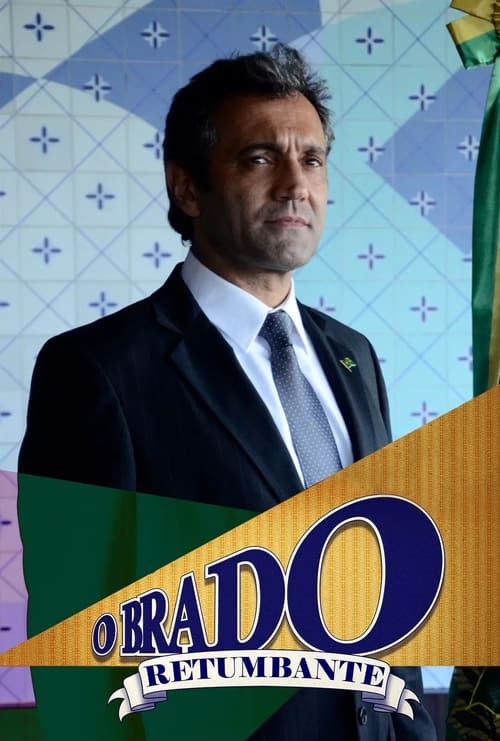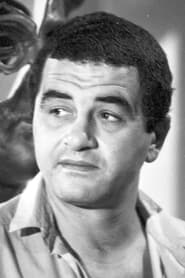
Ask Your Own Question
What is the plot?
The story begins in the tumultuous political landscape of Brazil during the 1980s, focusing on the life of a passionate and idealistic journalist named Lúcio. He is deeply involved in the fight against the military dictatorship that has gripped the country. Lúcio's commitment to uncovering the truth leads him to confront powerful figures, risking his safety and that of his loved ones. His determination is fueled by a desire for justice and a better future for Brazil.
As Lúcio navigates the dangerous waters of journalism, he becomes romantically involved with a fellow journalist, a strong-willed woman named Ana. Their relationship is passionate but strained by the pressures of their work and the political climate. Ana shares Lúcio's ideals but is more cautious, often urging him to consider the risks involved in his investigations. This tension between their personal and professional lives creates a complex dynamic that drives much of the emotional narrative.
The plot thickens when Lúcio uncovers a significant scandal involving high-ranking military officials and their corrupt dealings. He gathers evidence that could expose these individuals, but he knows that revealing this information could put him and Ana in grave danger. Despite the risks, Lúcio decides to publish the story, believing that the truth must come to light. This decision marks a turning point in the narrative, as it sets off a chain of events that will have dire consequences.
In the aftermath of the publication, Lúcio and Ana face immediate backlash. They receive threats from the military, and their lives are turned upside down. Lúcio's determination to stand by his principles leads him to go into hiding, while Ana grapples with her fear for their safety. The couple's relationship is tested as they struggle to maintain their connection amidst the chaos. Lúcio's internal conflict grows as he questions whether his pursuit of truth is worth the cost to their lives.
As the military intensifies its crackdown on dissent, Lúcio learns that several of his colleagues have been arrested or gone missing. This news deepens his resolve to continue fighting against the regime, but it also heightens his sense of vulnerability. He begins to realize that the stakes are higher than he initially thought, and he must make difficult choices about how to proceed. Lúcio's emotional state oscillates between hope and despair as he weighs the impact of his actions on those he loves.
In a dramatic twist, Lúcio receives a tip-off about a planned operation by the military to silence him permanently. He must act quickly to evade capture. With Ana's help, they devise a plan to escape the city and seek refuge with allies who can protect them. The tension builds as they navigate through the streets, constantly aware of the danger lurking around every corner. Their escape is fraught with close calls and moments of sheer panic, highlighting the oppressive atmosphere of fear that permeates their lives.
Once they reach safety, Lúcio and Ana find themselves in a network of activists who are also fighting against the regime. They become involved in organizing protests and spreading awareness about the human rights abuses occurring in Brazil. This new chapter in their lives reignites their passion for the cause, but it also brings new challenges. Lúcio struggles with the weight of leadership, feeling the pressure to inspire others while grappling with his own fears and doubts.
As the political situation escalates, Lúcio and Ana's relationship faces further strain. They are both deeply committed to the cause, but their differing approaches to activism create friction. Ana becomes increasingly frustrated with Lúcio's reckless behavior, while Lúcio feels that Ana is not fully embracing the urgency of their situation. This conflict reaches a boiling point during a particularly tense protest, where their differing views on strategy lead to a public argument that puts them at odds with each other.
In a climactic moment, the military launches a brutal crackdown on the protest, leading to chaos and violence. Lúcio and Ana are separated in the chaos, and Lúcio is captured by the authorities. The emotional turmoil of this moment is palpable as Lúcio realizes the gravity of his situation. He is taken to a detention center where he faces brutal interrogation and torture. His resolve is tested as he endures physical and psychological torment, but he clings to the hope of reuniting with Ana and continuing the fight for justice.
Meanwhile, Ana, devastated by Lúcio's capture, works tirelessly to gather support for his release. She reaches out to international organizations and rallies their friends and allies to raise awareness about his situation. Ana's determination to free Lúcio showcases her strength and resilience, but it also highlights her vulnerability as she navigates the treacherous waters of activism alone.
As the story progresses, Lúcio's plight becomes a symbol of the struggle against oppression. His story gains traction, and public outcry grows. Eventually, after months of pressure from activists and international attention, Lúcio is released from detention. The reunion with Ana is emotional and fraught with the weight of their experiences. They both realize that the fight is far from over, but they are more united than ever in their commitment to the cause.
In the final act, Lúcio and Ana join forces with other activists to plan a large-scale protest aimed at demanding accountability from the military government. The stakes are higher than ever, and the atmosphere is charged with tension as they prepare for what could be a pivotal moment in their struggle. The protest unfolds with a mix of hope and fear, as they face the possibility of violence once again.
The series culminates in a powerful and emotional climax as the protest takes place. Lúcio and Ana stand together, surrounded by their fellow activists, as they call for justice and an end to the dictatorship. The scene is filled with raw emotion, capturing the spirit of resistance and the longing for freedom. The outcome of the protest remains uncertain, leaving viewers with a sense of both hope and the harsh reality of their fight for a better future.
What is the ending?
In the ending of "O Brado Retumbante," the story culminates in a series of intense confrontations and resolutions among the main characters. The protagonist, a passionate and idealistic journalist, faces the consequences of his actions and the impact of his relentless pursuit of truth. The series concludes with a sense of unresolved tension, as the characters grapple with their choices and the societal issues they represent.
As the final episodes unfold, we see the protagonist, who has been deeply involved in the political turmoil of Brazil, confronting the realities of his ideals versus the harshness of the world around him. His relationships with other key characters, including his love interests and fellow journalists, reach a boiling point, leading to emotional confrontations that reveal their vulnerabilities and motivations.
In the closing scenes, the protagonist is left to reflect on his journey, the sacrifices made, and the cost of his convictions. The series ends on a poignant note, leaving viewers to ponder the implications of the characters' struggles and the broader societal commentary woven throughout the narrative.
As the final episodes of "O Brado Retumbante" unfold, the atmosphere is thick with tension and anticipation. The protagonist, a fervent journalist named Lúcio, stands at the center of a storm, both literally and metaphorically. The camera captures the rain-soaked streets of São Paulo, reflecting the turmoil within Lúcio as he grapples with the consequences of his relentless pursuit of truth.
Scene 1: Lúcio is seen pacing in his dimly lit apartment, the walls adorned with newspaper clippings and photographs of protests. His brow is furrowed, and his hands tremble slightly as he clutches a notepad filled with his thoughts. He is torn between his commitment to expose corruption and the safety of his loved ones. The weight of his choices hangs heavily on him, and the viewer can sense his internal conflict.
Scene 2: The narrative shifts to a heated confrontation between Lúcio and his editor, who urges him to tone down his reporting. The editor, a pragmatic figure, represents the voice of caution, while Lúcio embodies the idealistic pursuit of justice. Their argument escalates, with Lúcio passionately defending the need for truth in journalism, his voice rising above the clamor of the newsroom. The tension is palpable, and the stakes are high.
Scene 3: Meanwhile, Lúcio's romantic interest, Clara, is introduced in a parallel storyline. She is a fellow journalist who has been supportive of Lúcio's endeavors but is now increasingly worried about the dangers he faces. In a quiet moment, Clara expresses her fears, her eyes glistening with unshed tears. The emotional weight of their relationship is evident as Lúcio reassures her, though his own doubts linger.
Scene 4: As the climax approaches, Lúcio receives a tip about a major political scandal involving high-ranking officials. The urgency in his demeanor is palpable as he races against time to gather evidence. The camera follows him through bustling streets, capturing the chaos of protests and the fervor of the people demanding change. Lúcio's determination is unwavering, but the risks are evident.
Scene 5: The final confrontation occurs at a press conference where Lúcio plans to reveal his findings. The atmosphere is electric, filled with journalists and officials. As Lúcio stands at the podium, the weight of the moment crashes down on him. He takes a deep breath, his heart pounding, and begins to speak. The tension in the room is thick, and the audience hangs on his every word.
Scene 6: Just as Lúcio is about to unveil the truth, chaos erupts. Security forces storm the venue, and panic ensues. Lúcio's resolve is tested as he navigates through the chaos, desperately trying to protect Clara, who has come to support him. The camera captures their frantic escape, highlighting the dangers they face as they become targets for their pursuit of justice.
Scene 7: In the aftermath, Lúcio and Clara find themselves in hiding, reflecting on the events that have transpired. The emotional toll is evident as they confront the reality of their situation. Lúcio's idealism has come at a steep price, and Clara's unwavering support is both a comfort and a burden. They share a moment of vulnerability, acknowledging the sacrifices made for their beliefs.
Scene 8: The series concludes with Lúcio standing on a rooftop, overlooking the city. The sun sets in the distance, casting a warm glow over the skyline. He contemplates the future, the struggles ahead, and the impact of his choices. The camera lingers on his face, capturing a mix of hope and uncertainty. The final shot fades to black, leaving viewers with a sense of unresolved tension and the enduring fight for truth and justice.
In the end, Lúcio's fate remains uncertain, embodying the ongoing struggle for integrity in journalism and the complexities of personal sacrifice. Clara, too, is left to navigate the aftermath of their choices, highlighting the emotional and societal ramifications of their journey. The series closes, inviting reflection on the characters' paths and the broader implications of their fight against corruption.
Is there a post-credit scene?
"O Brado Retumbante," the 2012 Brazilian television series, does not feature a post-credit scene. The show concludes its narrative without any additional scenes after the credits roll. The series focuses on the life of a Brazilian politician, exploring themes of power, corruption, and the complexities of political life, culminating in a dramatic and impactful finale that wraps up the character arcs and storylines presented throughout the series. The absence of a post-credit scene allows the audience to reflect on the events and the fates of the characters without any further distractions.
What are the main conflicts faced by the character of Dr. Afonso in O Brado Retumbante?
Dr. Afonso, a prominent character in O Brado Retumbante, faces numerous conflicts throughout the series. His primary struggle revolves around his commitment to his medical practice and the ethical dilemmas that arise from the political turmoil in Brazil. As he navigates the challenges of providing care amidst a corrupt healthcare system, he grapples with his own moral compass, often feeling torn between his professional responsibilities and the societal pressures that demand he conform to the status quo. This internal conflict is compounded by his relationships with other characters, particularly his wife, who represents a more traditional view of family and duty.
How does the character of Dr. Afonso's wife, Ana, influence his decisions throughout the series?
Ana, Dr. Afonso's wife, plays a crucial role in shaping his decisions and emotional state throughout O Brado Retumbante. Her strong sense of family and traditional values often clashes with Afonso's progressive ideals, creating tension in their relationship. Ana's concerns for their family's safety and stability lead her to urge Afonso to prioritize their personal lives over his political activism. This dynamic forces Afonso to confront his own priorities, as he struggles to balance his love for Ana and their children with his desire to fight for social justice and reform in the healthcare system.
What role does the character of Dr. Afonso's mentor, Dr. Salgado, play in his development?
Dr. Salgado serves as a pivotal mentor figure for Dr. Afonso in O Brado Retumbante. He embodies the ideals of medical ethics and social responsibility, often guiding Afonso through the complexities of their profession. Salgado's unwavering commitment to patient care and his critiques of the political system inspire Afonso to take a stand against corruption. However, Salgado's own struggles with the system also serve as a cautionary tale for Afonso, highlighting the potential consequences of challenging authority. This relationship is marked by moments of admiration, conflict, and ultimately, a deep bond that influences Afonso's journey throughout the series.
How does the political backdrop of Brazil in the series affect the characters' personal lives?
The political backdrop of Brazil during the time of O Brado Retumbante significantly impacts the characters' personal lives, creating a sense of urgency and tension. The healthcare crisis, marked by corruption and inequality, forces characters like Dr. Afonso and his colleagues to confront their roles within a flawed system. As protests and political unrest unfold, the characters are often caught between their professional duties and their personal beliefs. This environment leads to strained relationships, as characters must navigate the repercussions of their choices, often resulting in emotional turmoil and a reevaluation of their priorities. The political climate serves as a catalyst for character development, pushing them to make difficult decisions that resonate throughout their personal and professional lives.
What is the significance of the character of Dr. Afonso's friend, Jorge, in the narrative?
Jorge, Dr. Afonso's friend, plays a significant role in the narrative of O Brado Retumbante as a representation of the everyday citizen affected by the political and healthcare crises. His character often serves as a sounding board for Afonso's frustrations and aspirations, providing a contrasting perspective on the issues at hand. Jorge's struggles with his own health and the bureaucratic obstacles he faces highlight the real-life implications of the systemic failures in the healthcare system. Through their conversations, Jorge challenges Afonso to consider the broader impact of his actions and decisions, ultimately pushing him to become more engaged in the fight for reform. Jorge's presence adds depth to the narrative, illustrating the interconnectedness of personal and political struggles.
Is this family friendly?
"O Brado Retumbante" is a Brazilian television series that delves into the complexities of family dynamics, politics, and social issues. While it offers a rich narrative, there are several aspects that may not be suitable for children or sensitive viewers.
-
Political Corruption and Manipulation: The series explores themes of political intrigue and corruption, which may be difficult for younger audiences to understand and could be unsettling for sensitive viewers.
-
Family Conflicts: Intense family disputes and emotional confrontations are central to the plot, showcasing the strain that political and personal ambitions can place on relationships.
-
Moral Ambiguity: Characters often face morally complex situations, leading to decisions that may be viewed as unethical or controversial, which could provoke discomfort.
-
Violence and Threats: There are scenes that depict violence or threats, reflecting the darker side of political struggles, which may be distressing for younger viewers.
-
Emotional Turmoil: Characters experience significant emotional distress, including betrayal, loss, and despair, which could be heavy for sensitive audiences.
Overall, while "O Brado Retumbante" offers a compelling narrative, its themes and content may not be appropriate for all viewers, particularly children or those who are sensitive to intense emotional and political situations.





















